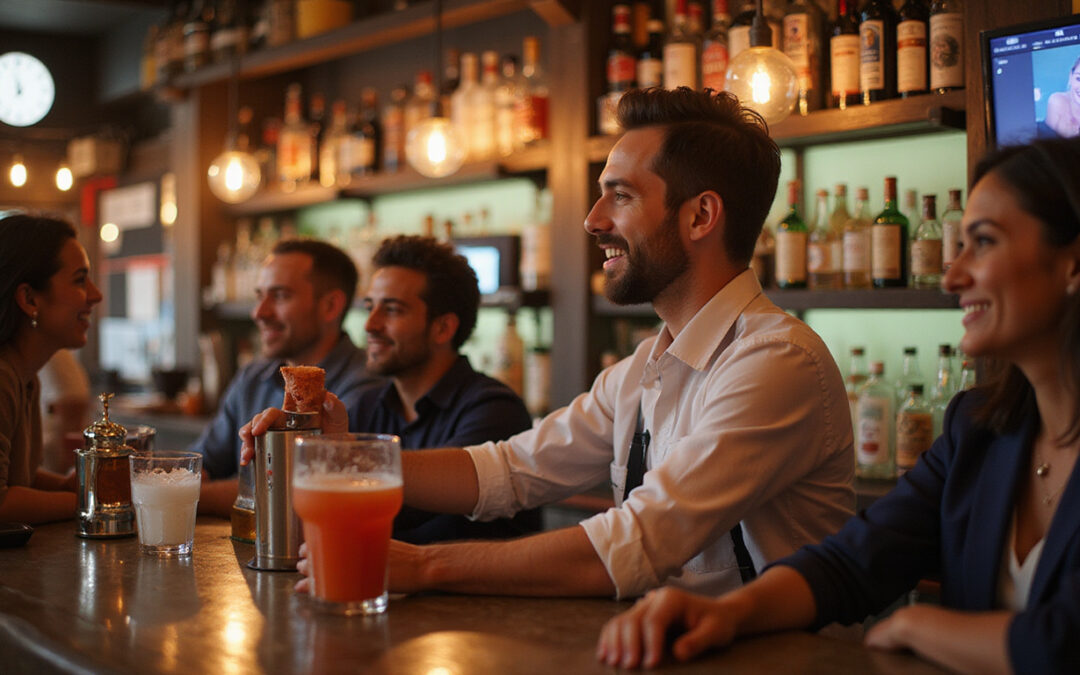In hospitality, responsible alcohol service matters. It builds safe spaces for guests, staff, and the community. Serving alcohol well lowers harm, shields businesses from legal issues, and lifts customer experience. This article shares key strategies for bars, restaurants, and event venues to serve alcohol safely without losing quality.
Understanding Responsible Alcohol Service
Responsible alcohol service gives drinks in a careful, thoughtful way. It cuts harm from too much alcohol or misuse. Staff learn to say no, see signs of intoxication, and check for legal age. This practice goes beyond rules—it stands for public safety and fair hospitality.
When service fails, bad outcomes follow. These range from accidents and fights to steep fines and loss of licenses. A sound service plan makes spaces safer and keeps the mood friendly.
Key Legal and Ethical Responsibilities
Hospitality staff bear legal and ethical duties when serving alcohol. Local laws may differ. They often say:
- Check that customers have valid ID.
- Stop serving guests who seem intoxicated or cause a scene.
- Do not serve minors.
- Train every employee on these steps.
Following these rules avoids legal trouble and builds trust with guests and the community.
Effective Training: The Foundation of Responsible Alcohol Service
Good training is key. Each person who handles drinks—bartenders, servers, and more—needs solid training. They learn:
- To spot intoxication. They watch for slurred speech, clumsy moves, or aggressive cues.
- To refuse drinks in a calm and safe way.
- To spot fake IDs and check real ones.
- To know different drink types and how much alcohol is in one drink.
- To manage conflicts and calm tense moments.
Regular updates keep everyone on track as laws and best steps change. Training builds skill and lessens risk for the business.
Identifying and Managing Intoxicated Patrons
A main goal is spotting guests with too much to drink. Signs include:
- Slowed or slurred speech
- Clumsy moves or poor balance
- Loud or out-of-place actions
- Flushed faces or watery eyes
- Strong alcohol smells
When these signs appear, staff follow these steps:
- Stop serving alcohol, saying so politely.
- Offer non-alcoholic drinks or food.
- Speak calmly and avoid fights.
- Call security or a manager if needed.
- Help arrange safe rides like taxis.
These steps cut the risk of accidents, fights, and loss of reputation.
Creating an Environment That Supports Responsible Drinking
The space itself should help safe choices. Ideas include:
- Design the room so people do not crowd and there is enough light.
- Offer many non-alcoholic or low-alcohol drinks.
- Serve food so drinking slows down.
- Set clear rules on when to stop serving and what guest behavior is allowed.
- Put up signs or run campaigns that remind guests to drink wisely.
These actions show a venue cares for public safety and can boost the overall experience.

Leveraging Technology to Enhance Responsible Service
Tech tools help staff serve well. For example:
- Electronic ID scanners check IDs fast and flag fakes.
- Point-of-sale systems track drink purchases and highlight over-serving.
- Security cameras keep an eye on guest behavior.
Technology works with human care to stick to the rules.
Community and Stakeholder Collaboration
Safe alcohol service does not happen alone. Working with community groups, law enforcement, and local officials adds strength. Partnerships can include:
- Joining Responsible Beverage Service (RBS) programs.
- Taking part in local safety projects.
- Sharing information on guest issues.
- Supporting laws that back safe drinking.
Working together builds a venue’s reputation and boosts public safety.
Summary of Key Strategies for Responsible Alcohol Service
To serve alcohol responsibly, venues should:
- Provide complete staff training on spotting intoxication, checking IDs, and saying no.
- Follow strict legal rules for age checks and service limits.
- Use clear steps to manage guests who are too drunk.
- Create a space that aids safe drinking with good light, seating, and food.
- Use tech like ID scanners and POS systems.
- Build community ties with relevant groups for safer practices.
Using these steps, businesses can keep safe, fun spaces for all.
Frequently Asked Questions (FAQ)
Q1: What is responsible alcohol service, and why is it important?
A: Responsible alcohol service means giving drinks safely, checking IDs, and refusing service when needed. It stops harm, prevents accidents, fights, and legal issues, and makes spaces safe.
Q2: How do staff get trained in alcohol service?
A: Staff get clear, simple training on spotting intoxication, how to refuse drinks, check IDs, and use calm language. Regular updates keep skills sharp.
Q3: What role does technology play in alcohol service?
A: Tech such as ID scanners, POS tracking, and cameras support staff by checking ages, tracking drink orders, and watching guest behavior.
Conclusion
Responsible alcohol service protects guests, staff, and the community. With good training, clear rules, smart tech, and community ties, venues create safe, fun spaces. This practice meets legal needs and raises the hospitality experience for everyone.
For more details on responsible alcohol service, check the National Institute on Alcohol Abuse and Alcoholism (NIAAA) for resources. Embracing these steps helps the hospitality industry thrive in a safe and smart way.


